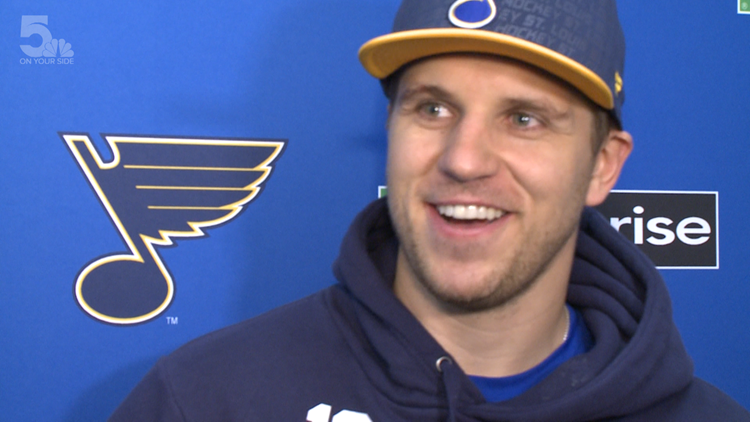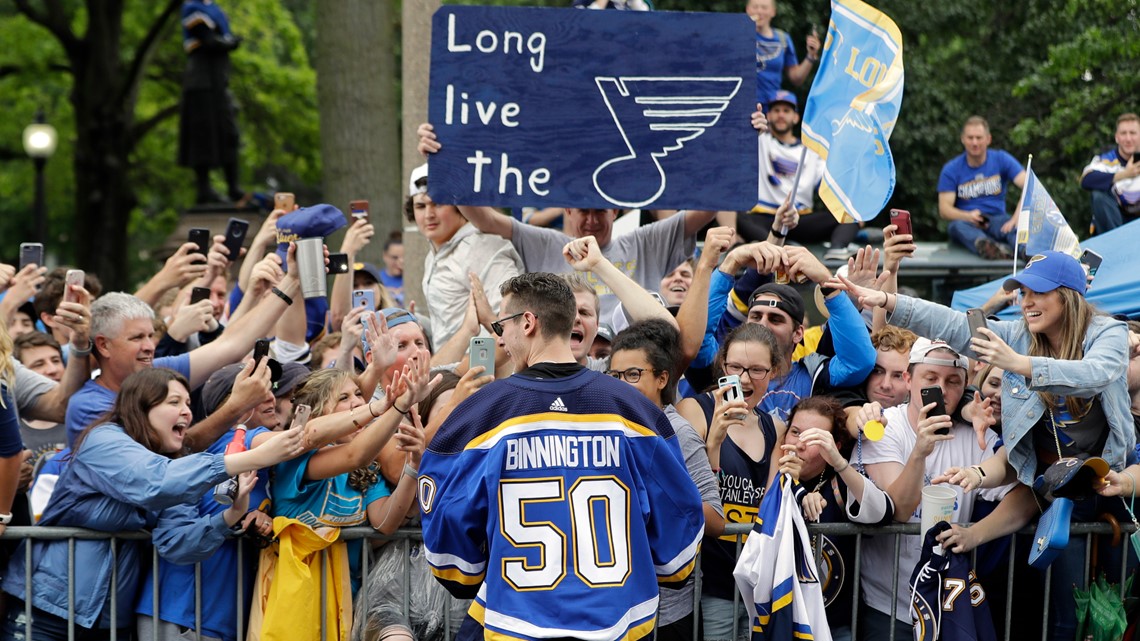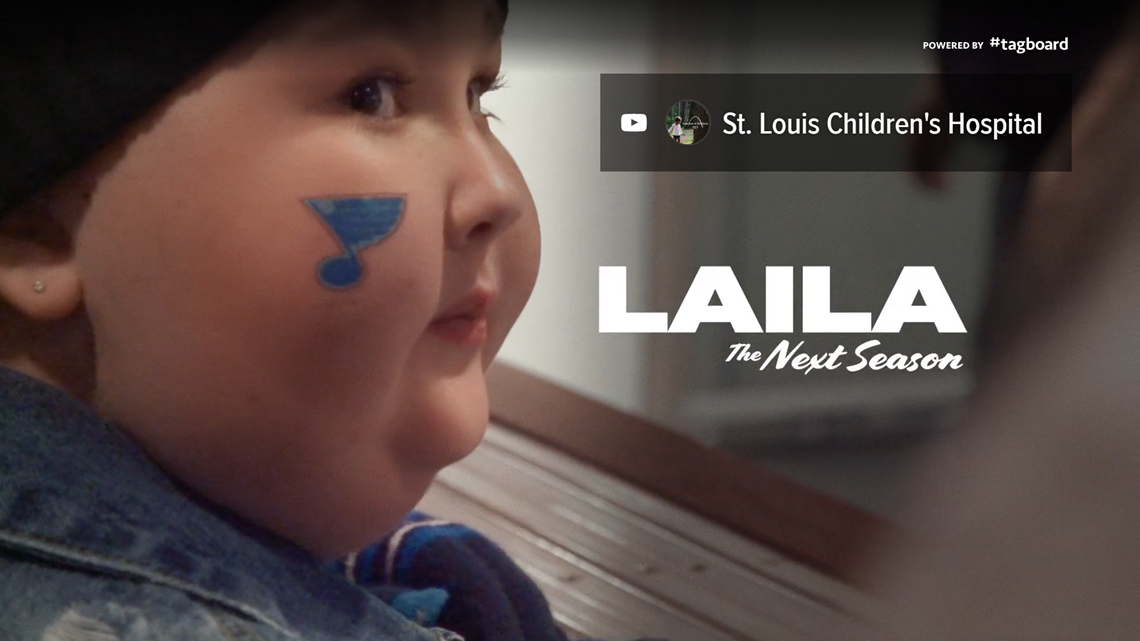ST. LOUIS — Brayden Schenn has been in a position of testing the free-agent market before only to choose to remain where he was at that time.
This time around, 2020 posed as Schenn's biggest opportunity to cash in for big dollars again.
Winning a Stanley Cup and developing a close bond and friendship with players he loves playing with once again steered Schenn in the direction of security and perhaps leaving more money on the table when he agreed to an eight-year, $52 million contract extension that carries a $6.5 million average annual value on Friday morning.
Schenn, 28, is in the final year of a four-year, $20.5 million contract he signed with the Philadelphia Flyers on July 25, 2016; he was traded to the Blues for Jori Lehtera and No. 1 picks in 2017 and 2018.
"Obviously really nice," Schenn said. "The organization, management, coaches have shown faith in me moving forward here, so obviously when they're going to go that, you want to buy in and when you see how good the team is here, how good we were last year, how good we can be, I think it only makes you want to stay. Obviously over the period of the contract, the term, the team is going to change, but the one thing that doesn't is the city and it's a great city to live in, great organization to play for. I'm looking forward to it.
"I'll be 28 when I'm done with this contract, so heading to the next one, I think the way the game is going and stuff like that, you never know how free agency's going to be. The cap's not supposed to go up a whole lot next year, so I think just having security, I think the main thing is just getting it off your mind, go out and play. It's really all there is. There's nothing more to it. I'm excited to be a part of this organization for years to come.
"We've got a lot of good pieces, a lot of good players here for upwards of three, four years and guys that are still in their prime. I think when you win a Cup with this organization and see how much it means to the city and now much they're a hockey town, it wants to make you just do it again. I'm happy to be here for years to come."
Schenn, who will earn $8 million in salary in three of the first four years (1-2 and 3-4) of the contract, $5.2 million in the third year, $6.5 million in the sixth year, $4.3 million in the seventh year and $4 million in the eighth year, is coming off a season in which he had 54 points (17 goals, 37 assists) in 72 regular-season games and 12 points (five goals, seven assists) in 26 playoff games. In two seasons with the Blues, he has 124 points (45 goals, 79 assists) in 154 games.
"Certainly getting 'Schenner' signed was a priority for us over the summer and working with (agent) Ben Hankinson and Brayden to get this behind us is very comforting knowing we're only one game into the season and we don't have to have this on our radar moving forward," Blues general manager Doug Armstrong said. "These things take a life of their own at different times. It really only takes one phone call to get things moving and we had had some conversations over the last seven or eight days and then they picked up yesterday to a point where everyone was comfortably uncomfortable last night about 10 o'clock."
Armstrong in the past two weeks has locked two players now into long-term contracts, including Schenn through the 2027-28 season and defenseman Justin Faulk, who the Blues acquired via trade from Carolina on Sept. 24 for Joel Edmundson, for seven years ($6.5 million AAV) through the 2026-27 season.
It leaves the Blue with two players with the potential to be unrestricted free agents after this season, defensemen Alex Pietrangelo and Jay Bouwmeester, and in the case of the 29-year-old Pietrangelo, who is in the final year of a seven-year, $45.5 million contract, Armstrong said it doesn't affect the Blues wanting to get him signed long term as well.
"I don't think so," Armstrong said. "I go back to a saying that someone told me, 'How do you get the horses back in the barn? You get them in one at a time.' We got one just in and now we've got to go corral another one and get him into the barn."
The Schenn contract is a win-win for both sides in the present that could at the end of it be a concern for the Blues, one in which they aren't worried about now.
Schenn was a core piece that helped the Blues win their first Stanley Cup last season and is being rewarded for it. The team is giving him security for the long term but in return, are getting a rather reasonable AAV when the player likely could have commanded 7-8 million on the open market.
"When you look at the contract signed by all the players, they're anywhere from 28 to even 31 or 32, you want to get that extended number to try and get that cap number down," Armstrong said. "Where we're at in our organization right now, we have a lot of players from 25 to 30 that are in the real guts of their career. I really felt it's in our responsibility as an organization and this is to Schenn and [Vladimir] Tarasenko and [Ryan] O'Reilly and Pietrangelo and [Colton] Parayko and that list is to support that group.
"They've done everything we've asked over the last five to six years to be a very competitive team. The last eight years, we've been very competitive. I know the term is something that we're going to have to deal with in all reality probably in six or seven years, but with that being said, we'd rather put a 12-, 13-, 14-year run together in a salary cap system and worry about that then, and we're going to need young players coming in at that time. The CBA could look different. You never know what it's going to look like, but I felt it was our responsibility and with the blessing of ownership to support that group that supported us for the last three or four years. They can see a reason to be here and wanting to be here for the next five or six years where we can be competitive."
In other words, Armstrong said the Blues are equipped to win more now and in the near future and is banking on it to do so.
It's rather uncommon of the Blues' GM to hand out the longer-type contracts, anything beyond five years, since he's only done that twice (Pietrangelo and Tarasenko's eight-year, $60 million contract in 2015) in his tenure here. But in order to build and keep what they have together now in a salary cap era, the Blues are going to have to sacrifice tenure for reasonable cap hits. But in doing so, they hope that the winning culture along with upgrades to the home facility at Enterprise Center and new training facility at the Centene Community Ice Center helps breed a winning culture and offers an alluring feel.
"That's what we're trying to build and I think obviously having playoff success, it's an easier sell right now," Armstrong said. "But quite honestly if you look at the Enterprise Center and the Centene Center, these things are going to start helping us sell ourselves. No program sells itself if you're not winning, and that's what talking to our ownership group, led by Mr. [Tom] Stillman and all of his partners, we've had eight good years and there isn't a reason why we shouldn't have another five or six with this group if we can keep them together.
"You look at what Boston did with [Patrice] Bergeron, [David] Krejci, players like that, [Brad] Marchand did an eight-year deal a couple years ago because he wanted to stay there. We're just not trying to do what other teams do, but you look at teams that have success and players that want to be part of a successful group, everybody makes sacrifices. We're doing it with strong ownership commitment to stay at the cap. We've been a cap team for eight years and we will be a cap team moving forward."
So including Schenn (nine years) and Faulk (eight years), the Blues will also have Tarasenko and O'Reilly each locked up for the next four years, David Perron for three years, Jaden Schwartz for two more years, and he'll likely be next on the pecking order as far as forwards are concerned; Parayko is locked in for three more years, the core is established enough to keep the tank at full or near full.
"When you're dealing with veteran players that are 27, 28, 29, the whole league knows who they are and we know who they are," Armstrong said. "There's a sprinkling of signings that tell you some of the posts that you want to use, but for us to stay competitive, we need to work with the players, they need to understand what we're trying to accomplish as far as an AAV and to do that, you give them the term that makes them comfortable. It's really a partnership at this time with that group of players."
Pietrangelo, who carries a $6.5 million cap hit, could conceivably get bumped into the 8-10 million category in his next contract, give or take. But he is 29 and has a lot of miles in his legs already, being this is his 10th full season. Should the Blues go on the higher number with Pietrangelo, there will be contracts that will be off the books within the next two years (Alexander Steen's $5.75 million cap hit in two years, Jake Allen at $4.35 million in two years, Bouwmeester's $3.25 million after this season and Tyler Bozak's $5 million in two seasons). That's roughly $18 million to distribute elsewhere (Schwartz, Parayko, Vince Dunn) and with the potential of the cap rising (it's at $81.5 million now), this core could conceivably remain intact for a number of years.
"These players are 26, 27, 28, 29. They have a number of years left," Armstrong said. "When you look at expansion, expansion usually adds a year or two to good players. We just had one expansion, we're having another one in a couple years. I know the players are hoping and I know the league is hoping the salary cap continues to rise. There's a big television deal coming up. I'm hoping that in four, five, six years, your salary cap has gone up significantly so the AAV of these contracts seem to come down.
"We're not abandoning the future of this franchise with these deals. We're just thinking it gives us a really good opportunity to be good for a long time and we will have to address some of these things moving forward. You're just never going to know what it's going to look like in six or seven years. Ultimately I'd like to be good for six or seven years. If we have to deal with it then, we'll deal with it then."
But in the meantime, the Blues will keep this ship afloat, and as far as Schenn is concerned, all parties are pleased.
"Obviously really happy for him," Schwartz said. "He's a big part of our team and a big reason why we won the Cup last year. I know he's excited to be around here for a long time. He's very well-liked in our locker room and an important piece on the ice. He's a guy that plays hard, he's a guy that plays on both ends of the ice, he digs in on draws, he can play a physical game, he can make plays offensively. Obviously everyone's really excited to see that he's locked up here for eight years.
"That's obviously real good to see and we're all excited for (keeping the core together). We've got a close locker room, guys are really good friends. We want to be around each other for as long as we can. To see the commitment from both sides is huge. He's a big piece of our team and we're pumped to have him moving forward."
Coach Craig Berube agreed: "He played well for us and was a big part of us winning. It's a good signing, good for everybody. ... He was part of the winning team here. These guys, they want to be here. It's a big thing and means a lot, which is important for the organization and it's great that players want to be here."
And give another feather in the cap to the Blues alumni, who were able to sell another player on the greatness of St. Louis.
"It's a friendly town, really good people, it's a great city," Schenn said. "I think that's one thing when you come in as a road team, you don't find out a whole lot about the city but obviously alumni speak for it here. There's a lot of alumni that live here. It's a great city to be a part of. Organization, new practice rink, our renovations to the game rink, get treated well here and as far as talking culture, it's an organization and culture that was built for us in the recent times with guys like 'Steener' and 'Petro' and what they've built around here. To have those years and to keep that going, I think it's important and it's fun to be a part of."






